
It’s hard to tell the difference between good pressure and performance anxiety.
Good pressure is that feeling of anticipation – you have prepared and the event is significant to you and you are aroused, fully focused, fully engaged in the moment and sharp. Some people call it having the butterflies.
Performance anxiety on the other hand is debilitating stress because of fear. I call that “weeds”.
Part of taking risks entails dealing with pressure; the greater the risks then the greater the pressures. But IMO, the deeper experiences in life are found where risks and pressures are significantly involved.
ANALOGY OF PRESSURE TO WEEDS & BUTTERFLIES
My yard is a wooded lot. I’ve tried everything, to get rid of the “bad stuff” —those pesky weeds, that tends to overtake the lawn. Isn’t it amazing how you never have to water your weeds and they still grow like crazy? In fact, you try everything to get rid of the weeds – mowing them, weed eater, spraying them with “weed be gone” and pulling them out from the roots. No matter what, it seems like the weeds continue to spread and are invasive of the “good stuff”/MY GARDEN & MY LAWN.
One of my favorite things to do when weeding the garden is watching the BUTTERFLIES – I love their majestic colors and how artistically and effortlessly they move. While doing my butterfly watching and weeding, I have a problem sometimes trying to distinguish the “bad stuff”/weeds from the “good stuff”/ lawn or plants – all too often, I just pull everything out.
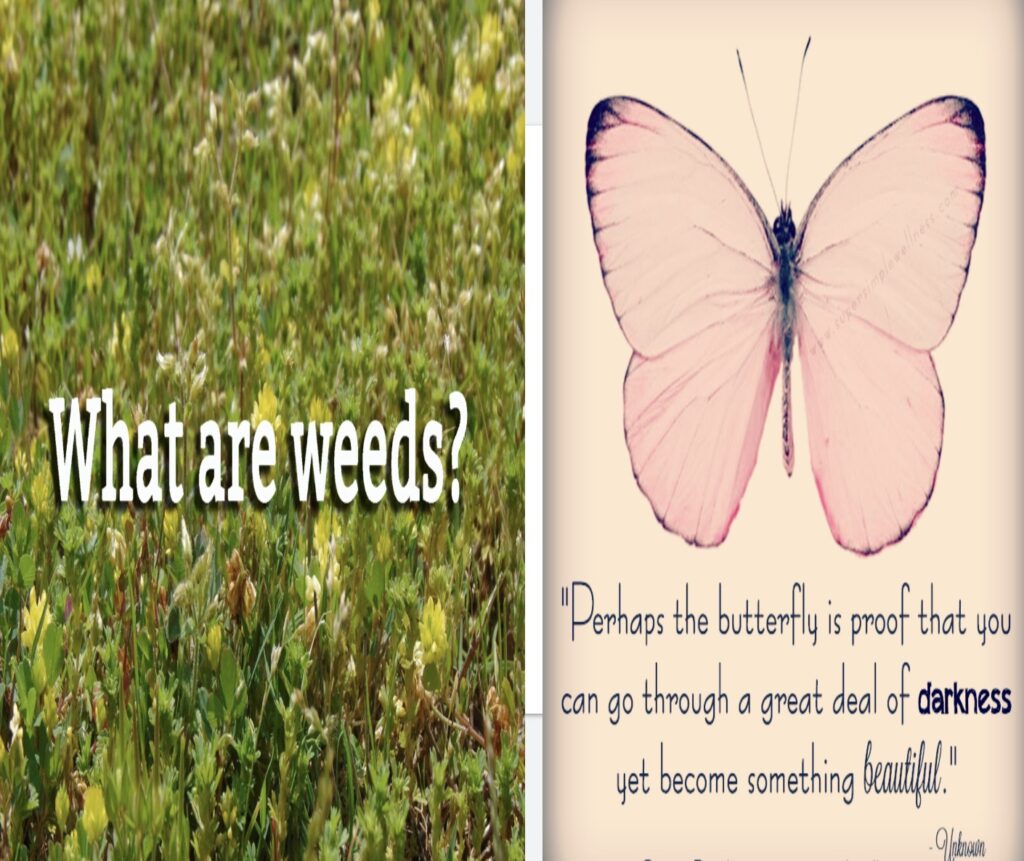
In sports, you have to continuously
- get rid of the “bad stuff” (weeds) — anxiety, fear, or the negative thinking and
- you have to work really hard to develop your talents (your lawn/your garden) —
- especially developing a growth mindset that understands failure is a prelude to success –
- and being able to distinguish between the two: what is a weed (bad, negative emotion) and what is the “good stuff”/pre-performance arousal.
We all have weeds in our life. These weeds can be self-limiting beliefs, negative thoughts and emotions, whining (self-pity), focusing on our problems rather than searching for solutions, blaming others, being apathetic, listening to the naysayers, etc.
I want to specifically address PRESSURE (butterflies) and PERFORMANCE ANXIETY (weeds). Just like weeds in the garden, it is hard to tell the difference between pressure and performance anxiety. Which one is a weed that needs to be pulled and which one needs to be nurtured and left in the garden to grow?
PRESSURE IS ALL ABOUT PERCEPTION. BAD performance anxiety or BAD pressure is when we are worried about the outcome and WHAT IFS IN THE FUTURE. We are afraid to fail (fear of failure) or we do not want to look bad in front of others or we are overly concerned about what others think (shame in your performance) or we do not want to disappoint someone other than ourselves, i.e. our teammates or parents (lack of acceptance).
GOOD pressure (BUTTERFLIES) is that feeling of anticipation; you are ready to go; you have prepared and you know that your performance MATTERS and the event is significant and you want to do you very best and your emotions are AROUSED TO AN OPTIMAL LEVEL SO YOU FEEL THE BUTTERFLIES. Good pressure is an adrenaline rush, an extra source of energy, and an emotion that fully engages you IN THE MOMENT and keeps you sharp and focused.
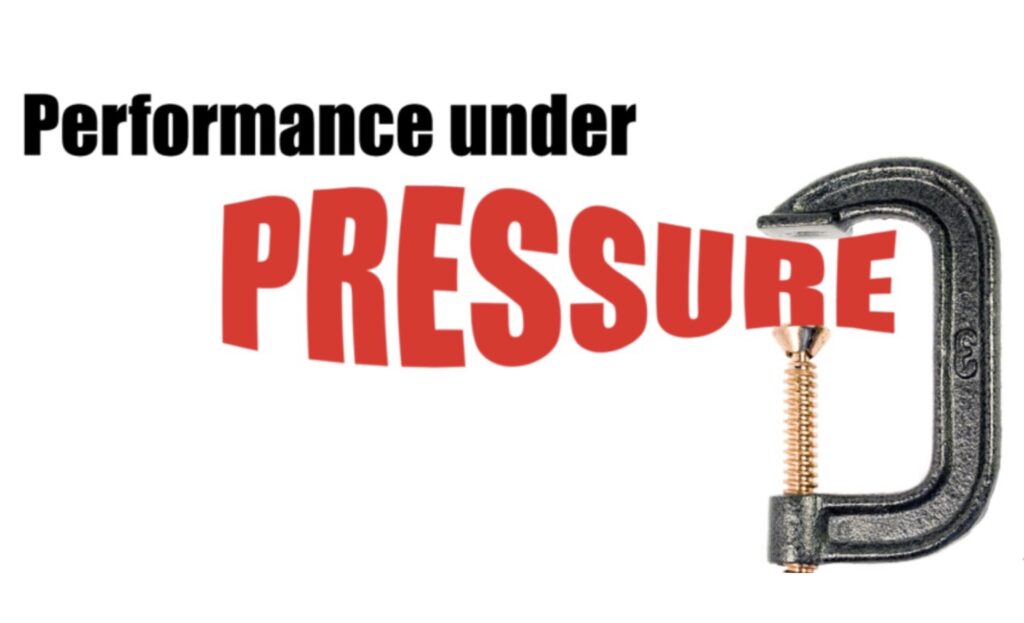
When it comes down to it: PRESSURE is not really the problem itself, BUT it is OUR INTERPRETATION OF IT. PRESSURE IS ALL ABOUT OUR PERCEPTIONS.
- Do we interpret and perceive pressure as exhilarating energy or is it a debilitating stress?
- Do you think pressure is an emotion that can be used to support your performance?
- Do you interpret it as a sign of fear?
- Do we use the pressure of the situation to energize us and make us feel completely alive?
- Do we worry that the feelings of pressure will make us choke?
The challenge is NOT to get rid of the feelings of pressure but to THINK about “IT” or perceive IT in a positive way.
- One example of proper thinking and perception would be to get the athlete to focus their minds on their preparation versus spending a lot of time worrying about the opponent.
- Another example would be to ask the athletes to apply themselves to the task at hand and their own particular assignments versus spending too much emotional or mental energy thinking about the outcomes and results and consequences.
- The athlete should be the one who determines whether their performances are successful or not —what did I learn from this game or that at bat, etc. Do not worry about what somebody else thinks of you or your performance.
- Your effort and attitude are what you control and should be the measure of your performance versus the box score or your stat line or your record or your batting average or what somebody says about you in a fan forum or blog.
Worries, fears, imperatives (“I have to”, “or else”, “must win”, “this is a big game”) are negative pressures that should be avoided.
- “If we don’t win this game, we are through”.
- “We need a sense of urgency to get this turned around”.
- “This is the biggest game of the year”. (Avoid making distinctions between games; treat every game with the same level of importance; treat every scrimmage just like a real game).
- “What if I choke or mess up?”
- “My opponent is so much better than me; what if he/she beats me badly & I get embarrassed on Sports Center?”
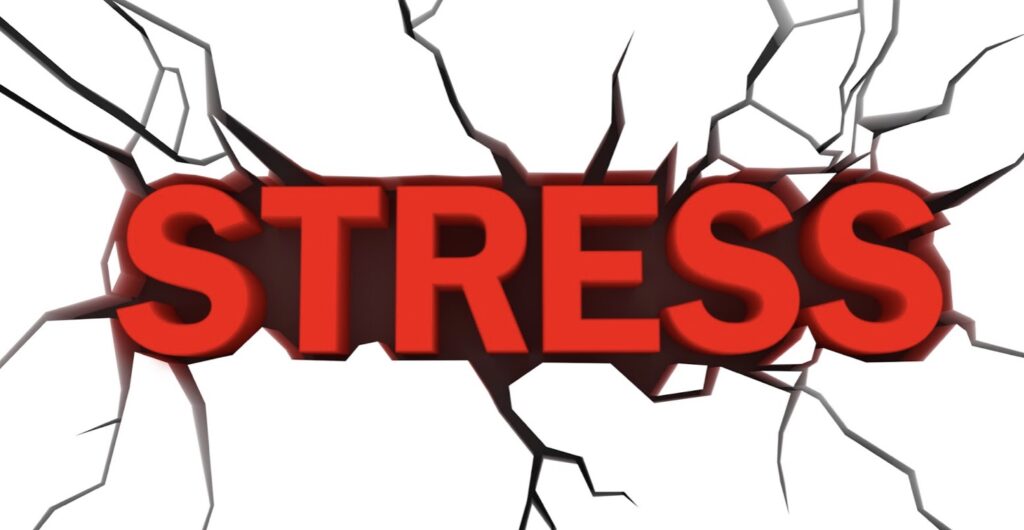
Your pre-performance concentration and focus and thoughts are totally on the wrong things and IN THE WEEDS. Mentally hanging out in the future like this with these outlandish thoughts right before the game is about to start will send your anxiety levels through the roof.
Once you start to get anxious, your muscles will tighten and your digestive system will abruptly stop working and you may even “TOSS YOUR COOKIES”. These are dangerous pressures that should be avoided and weeds that need to be pulled.
Do not entertain a win-or-else approach. Having a sense of urgency by giving special meaning to an upcoming game is usually counterproductive. The athlete is better served by staying focused on his/her preparation and continuing to do what is appropriate to accomplish the task at hand – let the outside world and the naysayers “talk up” the upcoming BIG game. Every game should matter; the goal is to always focus with intensity on this moment.
PRESSURE IS A PERCEPTION: A THREAT OR AN EXCITING CHALLENGE?
PRESSURE IS A PERCEPTION. One athlete can perceive a situation as THREATENING (fear of failure, worried about a bad perfomance and what other people will think) and the other athlete can perceive the SAME EXACT environment and circumstance as an exciting CHALLENGE (an opportunity to have a great at bat or an opportunity to throw an amazing riseball or an chance to prove that you can still perform at a high level).

It’s the interpretation of the mind that invokes the body’s response. An athlete’s reality is what HE/SHE BELIEVES IT TO BE.
COURAGE is not the absence of FEAR, but the ability to carry on in spite of it (Mark Twain).

The choice is ours: see the PRESSURE as a friendly butterfly (energy that can boost your performance); OR perceive it as invasive weed (debilitating stress). Here is the story of Bill Russell who won 11 NBA Championships with the Celtics, yet got so worked up before the games that he would vomit (toss his cookies). And when he did vomit, his teammates were comforted by it and welcomed the sound because they knew that their best player was ready and key up for the game.

Throwing up in terms of physiological arousal for most of us probably means that we are “over-amped” and “bad nervous”. It’s fine to have BUTTERFLIES bopping around in your stomach – that kind of excitement gets you ready for the performance. However, when you start having trouble breathing and you feel sick to your stomach and your digestive system has abruptly shut down, for most of us that means our pre-performance excitement is out of control and has turned from excitement to dread. This is a sign that your pre-performance concentration and focus and thoughts are IN THE WEEDS.
In trying to begin to untangle “the weeds” from the “good”, it becomes tough. The relationship between anxiety and performance is very complex. It is possible to be SIMULTANEOUSLY ANXIOUS AND EFFECTIVE – see the story of Bill Russell above. When Russell stopped throwing up for a stretch during the 1963 season, he had the worst slump of his NBA career.
So how do you find the right balance and get yourself into the performance zone where anxiety is beneficial? TOUGH QUESTION and differs for each different scenario and each different person.

- During the anxiety, redirect your mind to something other than YOU and how you are comporting yourself, instead FOCUS ON THE ACTION of the game: what type of pitch this is, is the outfield playing shallow, is the infield shifted, who is covering 2nd Base, what is the catcher’s pop time, etc.
- Do not let your mind become self-absorbed with YOURSELF or how people are judging you; keep your mind “busy” with going-ons of the action of the game.
- Allow your talent and preparation to kick in and carry you through.
- Do not focus on outcomes and consequences.
- Do not focus on how others are perceiving you.
- Focus on the ACTION OF THE GAME moment, THIS PITCH.
- BREATHE from your diaphragm to keep your sympathetic nervous system from revving up.
- It’s good to be keyed up; the right level of nervousness for you will enhance your performance.
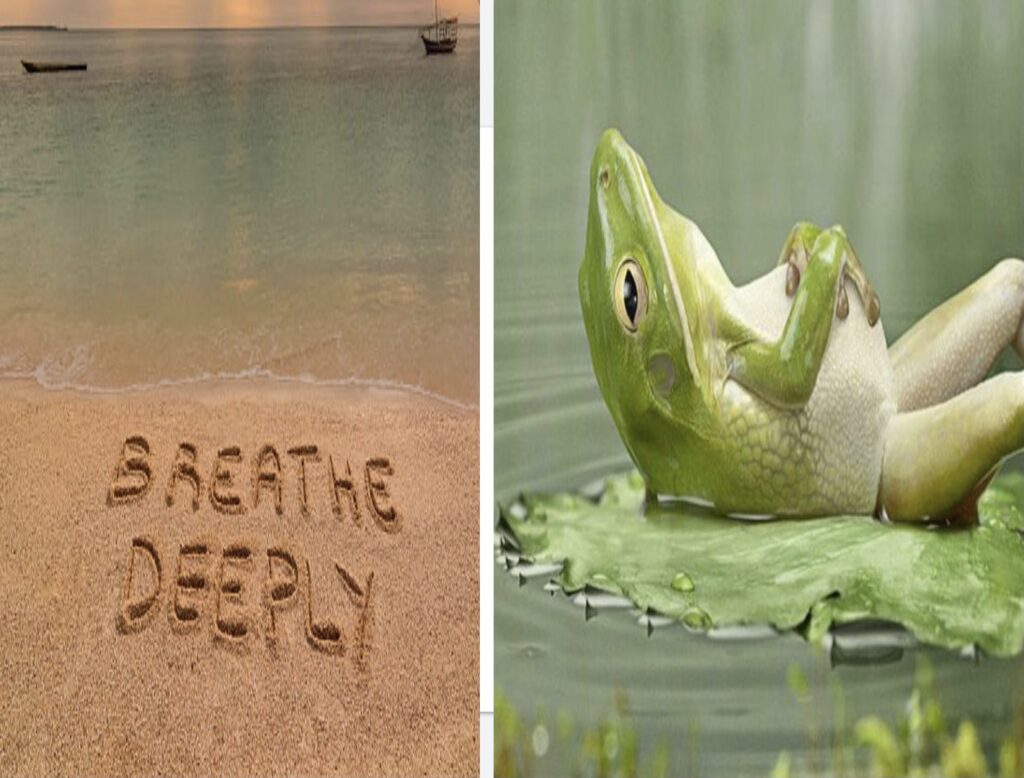
We all are on a continuous journey to develop the mental skills to be able to control our emotions. We all are trying to get better at the ability to focus on just the task at hand versus worrying about what somebody is thinking about how I am performing. We all continue to search for ways to calm our fears; to combat negative thinking; and to solidify our confidence so we can be at our best during clutch moments.
- What happens when you feel the enormity of the moment and your “thoughts” are that your SELF-WORTH depend on your performance (it’s ALL ON ME)?
- What if you put all the pressure on you? What if you perceive the pressure as being outcome based? You are setting yourself up for failure.
- What happens when you are in an unfamiliar environment or when accepting a new challenge for the FIRST time? Do you become nervous and fearful about the unexpected (WHAT IF)?
- Do you criticize yourself for not having enough power to be confident and trust in your preparation? Do you feel weak and powerless to reduce pressure on yourself? Control the controllables” and focus on the task at hand ONLY!
Winning, looking good to others, having a peak performance, and being confident are lovely desires, but they are NOT necessary (needs) for us to accept ourselves and are not the important measures of our success.
- If we could control winning, then guess what – I guarantee you, we would always win.
- If you could control your performance, you would always be on your ‘A’ game.
- If you could control your feelings, you’d always feel confident, happy, and optimistic.
- When you realize you don’t need any of these things to accept yourself, you can relax and then focus on the things that really matter.
As long as you criticize your fear of failure or you let others’ reaction to the results of your performance affect your self-acceptance, you will NOT get to your good feelings of confidence.
Telling yourself, “I can’t be anxious today” or chastising yourself for being afraid or worried before a game is criticizing yourself for having normal emotions.
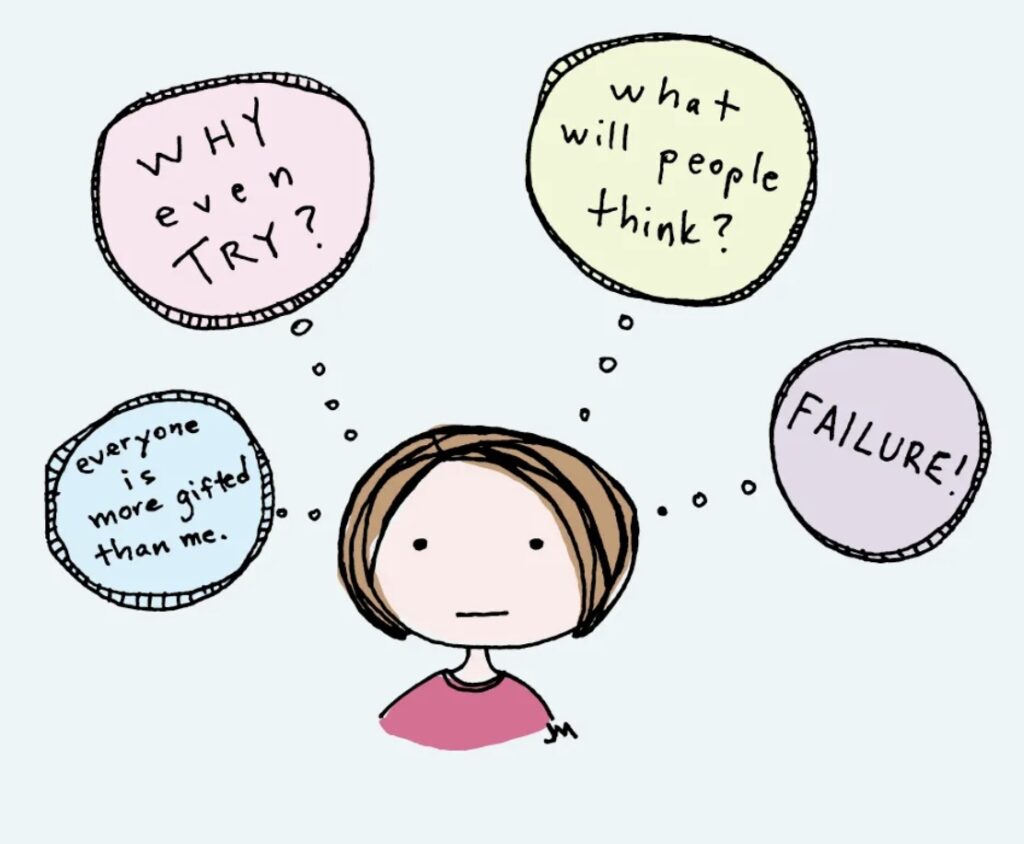
- Ask yourself, “Is the tension inside of you created by your performance anxiety (worried about an outcome)?” Then it is a WEED.
- Is the tension created by your self-criticism of yourself over your anxiety? WEED.
- Are you busy telling yourself that your mental state is wrong, and lecturing yourself and letting your inner critic tell you that you are not ready or not good enough or not worth or whatever your demon voice comes up with? WEEDS. Self-praise cannot start until self-criticism ends.
- Or is the feeling in your gut just making sure you are mentally ready to go? A BUTTERFLY.
- It’s always a good thing in pressure situations to be able to reflect rationally and ASK WHY and figure out the source of emotion – A BUTTERFLY.
When you can articulate why you deserve to be in this KEY moment and at this KEY time, then you are ready. Become aware of your self-criticism (weed) and then try to quiet the inner critic as you continue to invest in your own growth and the beautification of your garden.

Welcome the negative thoughts because they are there for everybody and will pop up at anytime – so we need to learn how to deal with it. No matter how hard any of us try, we cannot eliminate that demon voice inside our heads – it’s there. At the worst possible moment, you get the feeling of “I’m nervous” or your demon voice says, “You are going to lose”.
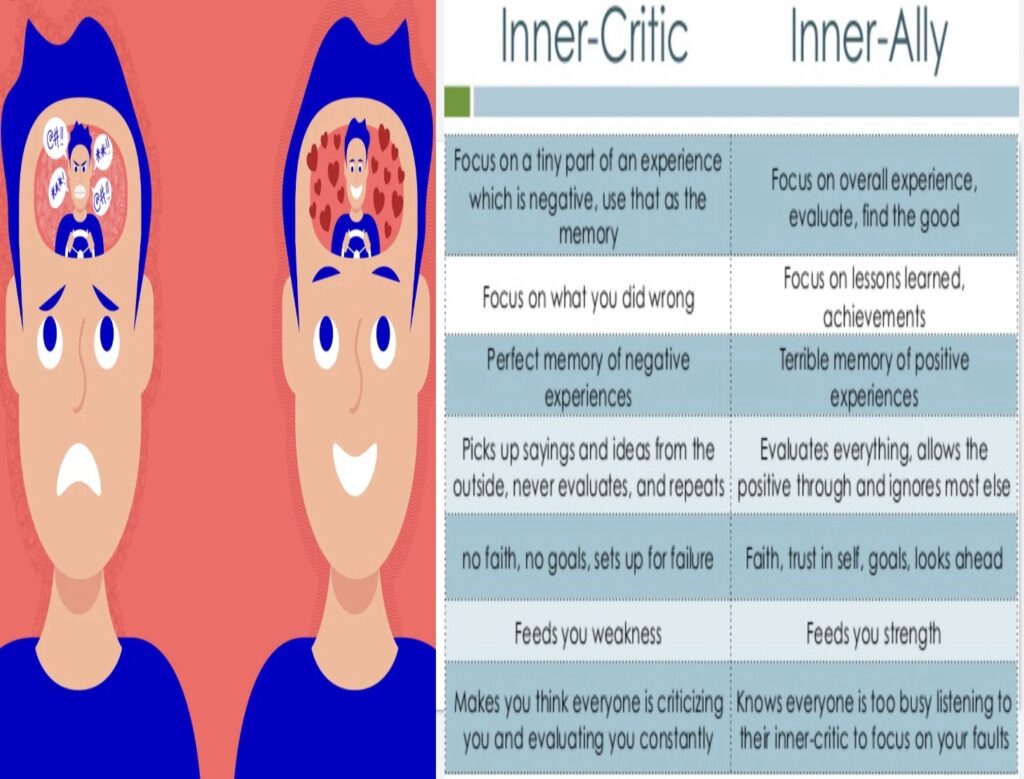
- Recognize it and detect when your self-talk is negative or tentative. Admit it. Then OVERCOME IT by a deep breathe;
- Bring in feelings of solid preparation and memories of successful performances in the past;
- Have positive, inner voice AFFIRMATIONS to repeat to yourself;
- Replace the negative thoughts with expressions of gratitude (you cannot be stressed and thankful at the same time).
- If you can remember one or two positives from any and all of your pursuits, you will approach the next pursuit with more and more confidence.
- As you mentally toil on this journey, you need to cling to all the success along the way – no matter how small – build on successes.
Controlling doubt under pressure makes an athlete CLUTCH! Once you know how to handle the weeds and welcome the butterflies, your yard will become beautiful – so too will your life.
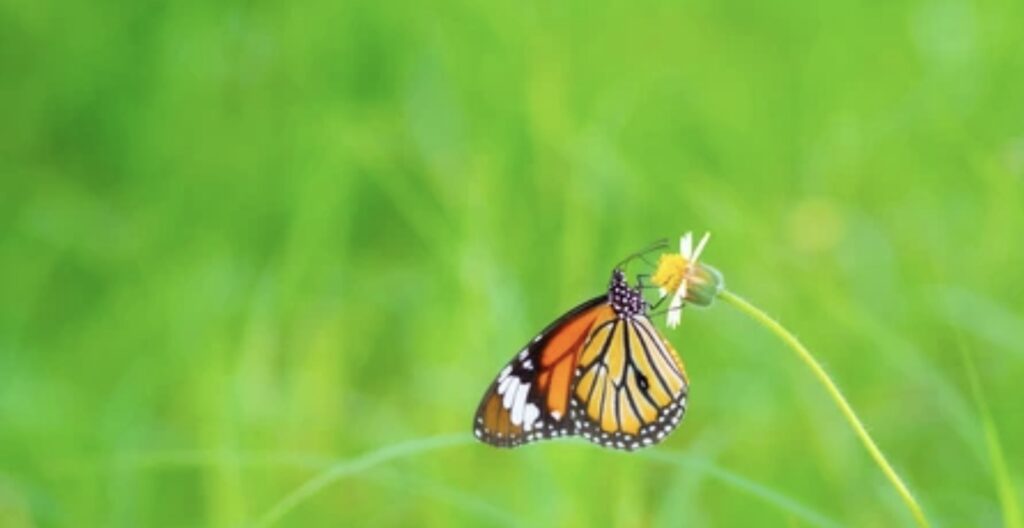
The next time you feel pressure, welcome it and embrace it and enjoy the feeling of being fully immersed in the challenges and risks of competition. Sometimes pressure leads to the temptation to look for “greener pastures”. In reality, GREENER PASTURES ARE OUR OWN GARDENS AND YOUR OWN LAWN.
You cannot run from your own pastures/garden NOR CAN YOU HIDE FROM YOUR OWN WEEDS. You have to stay and learn and perform and deal with the challenges. Tending to your garden becomes your legacy (for better or worse). Don’t believe that in “quitting and running off” to other pastures, that you can literally LEAVE BEHIND YOUR WEEDS. The better choice is to sow the seeds of your own green pastures/lawn/garden and continue to CULTIVATE, NURTURE, DEVELOP & GROW, all the while, finding solutions for the weeds and loving the butterflies.
PURSUE EXCELLENCE & WIN THIS PITCH!
About the Author

Mike Lotief coached 17 successful years as either the head softball coach or co-head softball coach with his wife Stefni Whitton Lotief at the University of Louisiana from 2002-2017 with an overall coaching record of 731-176 (80.6 winning percentage). Every season, the Ragin Cajuns softball team advanced to the NCAA tournament and also advanced to three (3) Women’s College World Series (2003, 2008, 2014) and from 2012-2016 advanced to five (5) straight NCAA Super Regionals. Coach Lotief produced over 40 All American selections and his 2017 team lead the nation in scoring and was ranked in the Top 10 in home runs, slugging percentage, on base percentage.
The coach is a cancer survivor (twice) and was the first person in the U.S. to receive the Pro Trach device. Mike and Stefni spearheaded and raised the funding to build the new softball stadium in 2009 and the new softball indoor hitting facility in 2015. They are proud parents to Chelsea, who played softball and graduated from the Univ. of Louisiana in 2018, and Andrew, who is a junior at Louisiana studying Mechanical Engineering.
Previous Articles in this Series
- The Mental Swing Attractors: Failure Cannot Break You (Nov. 11, 2021)
- Training Insights: “Swing Attractors” by Coach Mike Lotief… the Flaws of Pelvic Loading (Nov. 9, 2021)
- The Mental Swing Attractors: Push Yourself… You Don’t Have to Be #1 to BE #1! (Nov. 4, 2021)
- Training Insights: “Swing Attractors” by Coach Mike Lotief… Pelvis Loading, Part 2—The Planes of Movement (Nov. 2, 2021)
- The Mental Swing Attractors: Remove the Rope from Your Ankle & Get Rid of the Limiting Beliefs! (Oct. 28, 2021)
- Training Insights: “Swing Attractors” by Coach Mike Lotief… Pelvis Loading, Part 1—It’s All in the Hips (or Somewhere Deep Below) Oct. 26, 2021
- The Mental Swing Attractors: Champions are Developed by Devotion & Discipline! (Oct. 21, 2021)
- Training Expertise: “Swing Attractors”… the Secrets of Power Hitting by Coach Mike Lotief (Oct. 19, 2021)
More About Mike Lotief
- Why Michael Lotief is a Legendary Coach? by Jay Patel
- The Secret To Michael Lotief’s Success. By Jay Patel
- Michael Lotief Fights for Rajin’ Cajuns by Graham Hays ESPN
- Michael Lotief: Taking His Sport to New Heights by Neha Kapoor
- For the Love of the Game: A Look at Ragin’ Cajun Softball’s Power Couple
- How Louisiana-Lafayette’s Michael Lotief Develops Hitting Gems by Graham Hays ESPN
.
